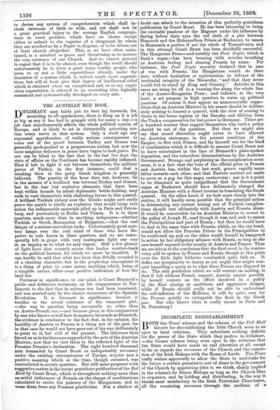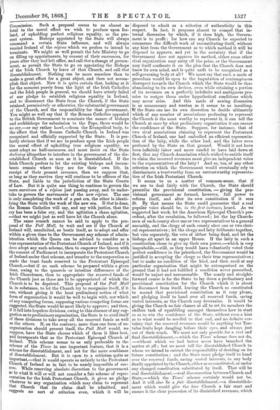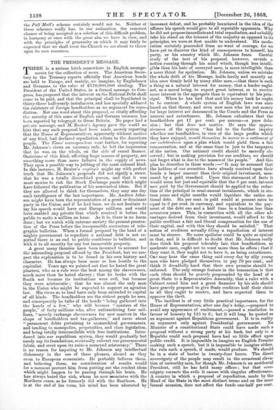INCOMPLETE DISESTABLISHMENT.
hostility of Austria to Prussia is a thing not of the past, for BOTH the Times' scheme and the scheme of the Pall Malt Commission. Such a proposal seems to us almost as fatal to the moral effect we wish to produce upon Ire- land, of upholding perfect religious equality, as the pre- sent system. Bishops appointed by the State will always command a certain State influence, and will always remind Ireland of the rig/me which we profess to intend to terminate. We might as well permit the late Ministry to go on filling up appointments, by consent of their successors, for years after they had left office, and call that a change of govern- ment, as permit the State to go on appointing the Bishops of the Irish Church by leave of that Church, and call that disestablishment. Nothing can be more senseless than to make a great effort for a great object, and then not accom- plish that object. Now it is quite certain that, looking at it for the moment purely from the light of the Irish Catholics and the Irish people in general, we should have utterly failed of our pledge to establish religious equality in Ireland, and to disconnect the State from the Church, if the State retained, permissively or otherwise, the substantial government of the Church, and the responsibility for that government. You might as well say that if the Roman Catholics appealed to the British Government to nominate the names of bishops and archbishops for submission to the Pope, there would be no cry,—or say rather howl,—from the Evangelical body, to the effect that the Roman Catholic Church in Ireland was recognized and officially supported by the State. It is per- fectly obvious that if we are to produce upon the Irish people the moral effect of upholding true religious equality, we must adopt no half-measures, and must insist on the State declining altogether to interfere in the government of the dis- established Church so soon as it is disestablished. If the Irish Church prefers to let the existing bishops and incum- bents remain where they are for their own life, in receipt of their present revenues, then we suppose that, so long as they survive they will continue to be officers of the State, and liable to the jurisdiction of the State Courts of Law. But it is quite one thing to continue to govern the mere survivors of a regime just passing away, and to under- take to govern the movements of the new regime. The one is only completing the work of a past era, the other is identi- fying the State with the work of the new era. If that is done, the Roman Catholics will say, and say with justice, that the cry has been a false cry, and the agitation a sham agitation, —that we might just as well have let the Church alone.
The same remark cannot be said to apply to the pro- posal of the Pall Mall, to wait and see if the Church of Ireland will, unsolicited, so bestir itself, as to adopt and offer within a given time to the Government any scheme of admin- istration which the Queen can be advised to consider as a true representation of the Protestant Church of Ireland, and if it does adopt any such scheme, then to empower the Queen with the consent of Parliament to incorporate the Protestant Church of Ireland under that scheme, and transfer to the corporation so made the trust funds reserved to the Protestant Episcopal Church,—but if no such scheme be prepared within a given time, owing to the quarrels or intestine differences of the Irish Churchmen, then to appropriate the reserved funds of the Church just as those are to be appropriated of which the Church is to be deprived. This proposal of the Pall Mall is, in substance, to let the Church try to reorganize itself, if it can, without giving it the least preliminary notion of what form of organization it would be well to begin with, nor which of any competing forms, supposing various competing forms are suggested, the State would be most likely to approve; and then, if it fall into hopeless divisions, owing to this absence of any sug- gestion as to preliminary organization, the State is to avail itself of these divisions to take away all the reserved funds as well as the others. If, on the contrary, more than one form of re- organization should present itself, the Pall Mall would, we suppose, have the State choose which of them it likes best, and incorporate that as the Protestant Episcopal Church of Ireland. This scheme seems to us only preferable to the scheme of the Times in one important feature, that it is a scheme for disestablishment, and not for the mere semblance of disestablishment. But it is open to a criticism quite as important,—that it would operate so unfairly to the Protestant Church of Ireland as in fact to be nearly impossible of suc- cess. While reserving absolute discretion to the government 48 to what it will or will not consider a fair scheme of repre- sentation for the Irish Protestant Church, it gives no pledge whatever to any organization which may claim to represent that Church that its claim shall be admitted, and suggests no sort of criterion even, which it will be disposed to admit as a criterion of authenticity in this respect. In fact, it proposes almost to compel that in- ternal dissension by which, if it rises high, the Govern- ment is to profit ; for how can any Church be expected to commence the difficult work of reconstituting itself, without any hint from the Government as to which method it will be disposed to approve, and yet in the certainty that if the Government does not approve its method, either some other rival organization may carry off the prize, or the Government may itself confiscate it on the plea that the Church does not know its own mind, and is quite unfit to be recognized as a self-governing body at all? We must say that such a mode of procedure would be open to the imputation of contemptuous disrespect towards the Church which the State would be thus abandoning to its own devices, even while retaining a portion of its revenues on a perfectly indefinite and ambiguous pro- mise to restpre them under hypothetical conditions which may never arise. And this mode of sowing dissension is as unnecessary and wanton as it seems to us insulting. If the State can use its own discretion to decide ultimately which of any number of associations professing to represent the Church is the most worthy to represent it, it can tell the Church at once by what preliminary organization it can ensure the confidence of the State. Suppose, for instance, that of two rival associations claiming to represent the Protestant Church of Ireland, one had embodied no efficient representa- tion of the laity, while the other had, and the latter were preferred by the State on that ground. Would it not have been infinitely fairer and more candid to have laid down at first, that any Church Association which wished to entitle itself to claim the reserved revenues must give an independent voice to the representatives of the laity ? And so, too, of any other criterion on which the Government would eventually rely to discriminate a trustworthy from an untrustworthy representa- tion of the Irish Protestant Church.
It seems to us a matter of common-sense, that if we are to deal fairly with the Church, the State should prescribe the provisional constitution, — giving the pro- visional government so formed, however, full power to reform itself, and alter its own constitution if it sees fit. By that means the State could guarantee that a real popular voice should be, in the first instance, heard. As we' suggested last week, let the American Episcopal Church's pre- cedent, after the revolution, be followed ; let the lay Church- men of each county elect one or two representatives to a general assembly, and the clergy of each county elect one or two cleri- cal representatives ; let the clergy and laity deliberate together, but vote separately, the veto of either being final, and let the bishops sit apart in an upper House. If the laity in such a constitution chose to give up their own power,—which is very improbable,—still, as they would have voluntarily voted their perfect confidence in the priesthood, the Government would be justified in accepting the clergy as their true representatives ; but to make no condition of the kind, and then cavil at any particular organization that might be extemporized on the ground that it had not fulfilled a condition never prescribed, would be unjust and unreasonable. The manly and straight- forward course is for the State to lay down a preliminary and provisional constitution for the Church which it is aboat to disconnect from itself, leaving the Church so constituted to amend that provisional constitution as it may please, and pledging itself to hand over all reserved funds, saving vested interests, as the Church may determine. It would be giving the Church no fair chance at all to set its members the endless task of squabbling amongst themselves how to start so as to win the confidence of the State, without even a hint as to what would be needful to that end, and no definite cer- tainty that the reserved revenues would be anything but Tan- talus fruits kept dangling before their eyes, and always just out of their reach. We must not only provide for a real and final disestablishment,—which the Times' scheme does not do, —without which we had better never have broached the matter at all ; but we must tell the disestablished Church to whom we intend to entrust the responsibility of deciding on its future constitution ; and the State must pledge itself to hand over the reserved funds, saving vested interests, to any body finally appointed by the Church, either as so constituted, or under any changed constitution substituted by itself. That will be real disestablishment—real disconnection between Church and State,—which the Times' scheme certainly would not be. And it will also Se a fair disestablishment,—a disestablish- ment which would give the free Church a fair start and ensure it the clear possession of its diminished revenues, which the Pall Mall's scheme certainly would not be. Neither of these schemes really has, in our estimation, the remotest chance of being accepted as a solution of this difficult problem, in harmony at once with the great aim we have in view, and with the principles of generosity on which it may fairly be expected that we shall treat the Church we are about to throw upon its own resources.




































 Previous page
Previous page